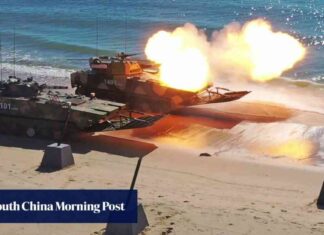China’s Rising Confidence and Caution: Navigating a New Era
As China continues to assert its position on the world stage, the global community is left to ponder whether to admire or fear the country’s model of governance. With President Xi Jinping leading the charge, China is determined to shed its image as a “fat cat” and emerge as a “strong tiger” in the international arena. The shifting dynamics of China’s rise have sparked debates and discussions worldwide, with implications that extend far beyond the country’s borders.
The Road to Confidence
Over the past few decades, China has undergone a remarkable transformation, transitioning from a closed-off society to a global superpower. The country’s economic growth, technological advancements, and military capabilities have all contributed to its rising confidence on the world stage. President Xi Jinping’s ambitious vision for China’s future, as outlined in his speeches and policy initiatives, reflects a desire to assert China’s influence and power in various spheres.
One key aspect of China’s newfound confidence is its assertive foreign policy stance. The Belt and Road Initiative (BRI), for example, is a testament to China’s ambition to expand its economic and geopolitical influence across the globe. By investing in infrastructure projects in countries around the world, China aims to strengthen its ties with other nations and establish itself as a key player in the international arena.
Caution in the Face of Challenges
Despite its growing confidence, China is not without its challenges and vulnerabilities. The country faces internal issues such as income inequality, environmental degradation, and an aging population, which pose significant obstacles to its continued growth and stability. Externally, China’s rise has fueled concerns among other countries about its intentions and actions on the world stage.
One major source of contention is China’s assertiveness in territorial disputes, particularly in the South China Sea. The country’s aggressive actions in asserting its claims to disputed islands and maritime territories have raised tensions with neighboring countries and drawn criticism from the international community. China’s military buildup and assertive behavior in the region have led to concerns about the potential for conflict and instability in one of the world’s most strategically important waterways.
Navigating a Complex Landscape
As China grapples with the complexities of its rise, it must carefully navigate a rapidly changing global landscape. The country’s interactions with other major powers, including the United States, Russia, and the European Union, will shape the course of international relations in the coming years. China’s economic and technological prowess, coupled with its growing military capabilities, have positioned it as a key player in global affairs.
One key challenge for China is striking a balance between its desire to assert its influence and power and the need to maintain stability and cooperation with other countries. The interconnected nature of the global economy and the complex web of diplomatic relationships require China to tread carefully in its interactions with the rest of the world. President Xi Jinping’s calls for a “community of common destiny” and a “new type of international relations” reflect China’s efforts to promote cooperation and mutual benefit in its dealings with other countries.
In conclusion, China’s rising confidence and caution in navigating a new era reflect the complexities and challenges of its emergence as a global superpower. As the country asserts its influence and power on the world stage, it must also address internal issues and external concerns to ensure a stable and prosperous future for itself and the rest of the world.



























